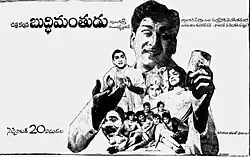Buddhimantudu
| Buddhimantudu | |
|---|---|
 Theatrical release poster | |
| Directed by | Bapu |
| Screenplay by | Bapu |
| Story by | Mullapudi Venkata Ramana |
| Produced by | N. S. Murthy |
| Starring | Akkineni Nageswara Rao Vijaya Nirmala Sobhan Babu Krishnam Raju |
| Cinematography | S. Venkataratnam |
| Edited by | A. Sanjeevi |
| Music by | K. V. Mahadevan |
Production company | Chitra Kalpana |
Release date |
|
Running time | 176 minutes |
| Country | India |
| Language | Telugu |
Buddhimantudu (transl. Good Boy) is a 1969 Indian Telugu-language drama film directed by Bapu. It stars Akkineni Nageswara Rao, Vijaya Nirmala, Sobhan Babu and Krishnam Raju, with music composed by K. V. Mahadevan. The film was remade in Tamil as Manidhanum Dheivamagalam (1975) and in Hindi by the same director as Paramaatma (1994).[1]
Plot
Madhavacharya is an ardent devotee of Lord Krishna. He works as a temple priest, and everyone in the village admires him. Whenever Madhavaiah views Lord Krishna's idol he has mystic experiences in which he is able to converse with the god himself. His younger brother, Gopi, on the other hand, leads an idle life, even though he is kind at heart and struggles for the welfare of the villagers. Seshadri, the village head, is an evil person. He creates problems in the lives of the villagers and Gopi stands up to him while Madhavaiah believes he is wise and respects him. Gopi falls in love with Radha who is the daughter of Seshadri's sister Kaveramma. With her good influence, Gopi reforms. Seshadri’s son Krishna is a ne'er-do-well who traps the village schoolteacher’s daughter Kasturi with false promises of love. Despite being anxious about their elders' casteism Gopi and Radha vow to be together.
Gopi's old friends forcibly take him to carouse with them like the old times. Seshadri exploits this situation to paint Gopi in a bad light. He succeeds in making even Radha doubt Gopi. Madhavaiah, with the provocation of Seshadri, throws Gopi out of the house and gives an old, ruined building as his share of their family property. Seshadri spreads rumors about Radha and Gopi’s relationship which leads to Kaveramma's death. Seshadri plans to marry off Radha to his son Krishna to grab her property. Gopi renovates the old building and transforms it into a school building for the poor villagers. In retaliation, Seshadri removes Madhavaiah from his post as the priest. Distressed, Madhavaiah has a breakdown and feels as if Lord Krishna accompanies him. Gopi revolts against Seshadri while Seshadri steals the temple ornaments and orders his henchmen Ramalingam to bury them in Gopi's home. The cunning Ramalingam double-crosses him and takes off with the jewelry. The next day, when upon Seshadri’s instigation Gopi’s home is searched, a treasure of Madhavaiah and Gopi's ancestors is found to be buried there. The brothers argue with each other on how to utilize it. Madhavaiah wants to use it for the temple but Gopi wants it for the school.
Seshadri ploys to capture the treasure. He decides to conduct local elections, and both the parties strongly campaign. Gopi finds out the secret of temple robbery through Ramalingam and exposes the theft. Radha starts to trust Gopi once again. Krishna steals the treasure and kidnaps Radha. Gopi rescues Radha and makes Krishna repent for his mistakes. Meanwhile, Gopi's supporters, without his knowledge, challenges Madhavaiah to show a miracle by lifting the dome of the temple into the air if God exists. Madhavaiah accepts it and Seshadri paints him as a lunatic. A disturbed Madhavaiah locks himself in the temple where Lord Krishna tells him that God will not respond to evildoers. At this juncture, Gopi understands his distressed brother will not survive unless a miracle actually happens. He lifts the dome from the backside of the temple. Madhavaiah calms down and when he spots Gopi, he says that Lord Krishna performed the miracle through his brother. He also realizes that serving people is equivalent to offering God. At last, they utilize the treasure for the welfare of the people, and Seshadri gets arrested. The film ends with the marriage of Gopi and Radha.
Cast
- Akkineni Nageswara Rao as Madhavacharya and Gopi
- Vijaya Nirmala as Radha
- Sobhan Babu as Krishna
- Krishnam Raju as Krishna
- Gummadi as D.E.O.
- Nagabhushanam as Sheshadri
- Allu Ramalingaiah as Ramalingam
- Sakshi Ranga Rao as Achary
- Bhanu Prakash as Master
- Vijayachander as Gopi's friend
- Devadas Kanakala as Gopi's friend
- Suryakantham as Kanthamma
- Santha Kumari as Shantamma
- Rukmini as Kaveramma
- Meena Kumari as Meena
- Sandhya Rani as Kasthuri
- A. Sakunthala
- Chalapathi Rao
- Ranganath
Soundtrack
Music composed by K. V. Mahadevan.[2] The song "Badilo Emundhi" was considered by M. L. Narasimham of The Hindu to sum up the essence of the film.[3]
| Song Title | Lyrics | Singers | length |
|---|---|---|---|
| "Bhoommeeda Sukhapadite" | Aarudhra | Ghantasala | 4:20 |
| "Havvare Havva" | Aarudhra | Ghantasala | 4:41 |
| "Tata Veedukolu" | Aarudhra | Ghantasala | 4:20 |
| "Guttameeda Guvva Koosindi" | Aarudhra | Ghantasala, P. Susheela | 4:39 |
| "Allari Pedatare Pilla" | Kosaraju | Pithapuram, Swarnalata | 3:00 |
| "Thotaloki Raakura" | Dasaradhi | P. Susheela | 3:42 |
| "Nanu Palimpagaa" | Dasaradhi | Ghantasala | 4:03 |
| "Badilo Emundhi" | Kosaraju | Ghantasala | 3:20 |
References
- ^ Arunachalam, Param. BollySwar: 1991–2000. Mavrix Infotech. p. 517. ISBN 978-81-938482-1-0.
- ^ "Buddhimanthudu (1969)-Song_Booklet". Indiancine.ma. Archived from the original on 9 April 2024. Retrieved 12 November 2022.
- ^ Narasimham, M L (3 April 2018). "An uphill task". The Hindu.